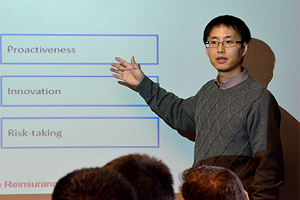Dr. Jifeng Yu, assistant professor of management at the University of Nebraska–Lincoln College of Business Administration, finds strategic management research exciting – particularly when analyzing problems yet to be fully explored. His enthusiasm has led to eight papers accepted for publication in the past three years alone.
One of Yu’s articles “Effects of Alliances, Time and Network Cohesion on the Initiation of Foreign Sales by New Ventures” published in
Strategic Management Journal looks at how companies form alliances to boost sales of new ventures in foreign markets.
“Normally when people talk about alliances, they are looking at one company partnering with another,” Yu said. “What interests me is the characteristics of the entire alliance network and how it affects a firm’s decision making. I look at marketing alliances, technological alliances and how those alliances are used to buy companies to develop new technologies. I connect the dots between all the alliances and that’s what makes my research unique.”
In a related paper, “Reinsurance Networks and Their Impact on Reinsurance Decisions: Theory and Empirical Evidence,” forthcoming in the
Journal of Risk & Insurance, Yu studies how alliances in reinsurance networks can affect companies’ hedging decisions. He examines both the benefits and potential harm that occurs when forming alliances.

Jifeng Yu teaching a seminar at CBA
“There is a huge body of research looking at alliance networks, but most only focus on the positive side. Normally they look at how companies leverage the capabilities of their partners, but we discovered there is a dark side to strategic alliances.
During the last financial recession, we found one company’s risk quickly spreading from company to company, and mortgage and markets took a huge hit. AIG was one example of a very profitable company that almost went bankrupt. My paper helps explain the phenomenon of the collapse in business markets that can occur because of alliances,” he said.
A second body of Yu’s research relates to corporate innovation, including another article “The Payback of Innovation: Empirical Evidence from Firms that have Won Innovation Awards,” forthcoming in
Production and Operations Management.
“We found some very complicated processes at work when companies determine whether or not to engage in innovation. There are two major stages. The first we call the invention stage which is the idea creation and generation. At this stage, companies don’t have to worry about the commercialization of the idea.”
Yu believes much of the literature to this point has only focused on the first stage of innovation and therefore, has not fully captured how companies can benefit from new ventures.
“The second stage is the commercialization stage where you look at the feasibility of the idea and the practical value to society. We did a longitudinal study over seven years with hundreds of U.S. companies. It turns out innovation does matter and is beneficial to a company when you consider the commercialization stage. If you just look at the innovation stage, it is purely a short-term expense and companies don’t see immediate benefits,” he said.
The article also underscored the importance of winning innovation awards and the positive impact it has on a firm’s ability to profit on innovation.
Yu joined CBA in the fall of 2012 after teaching for six years at the University of Nevada in Las Vegas. He and his wife, Dr. Yijia Lin who teaches finance at CBA, have a three-year-old daughter.
"Las Vegas is a fun city especially if you are traveling, but I'm really glad we came to Nebraska. Lincoln is a great place to raise a family."
Published: June 10, 2014